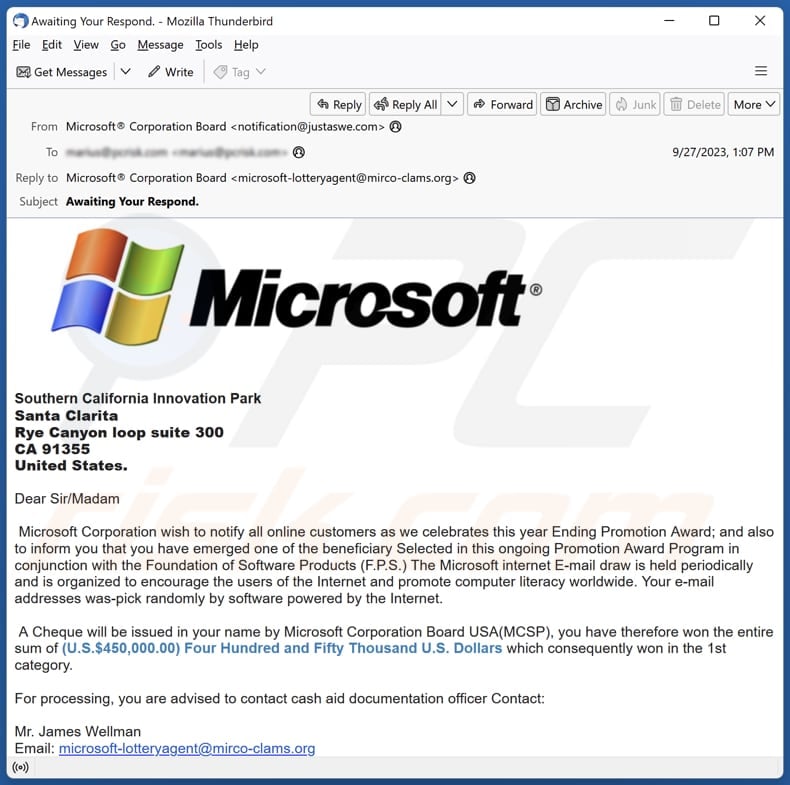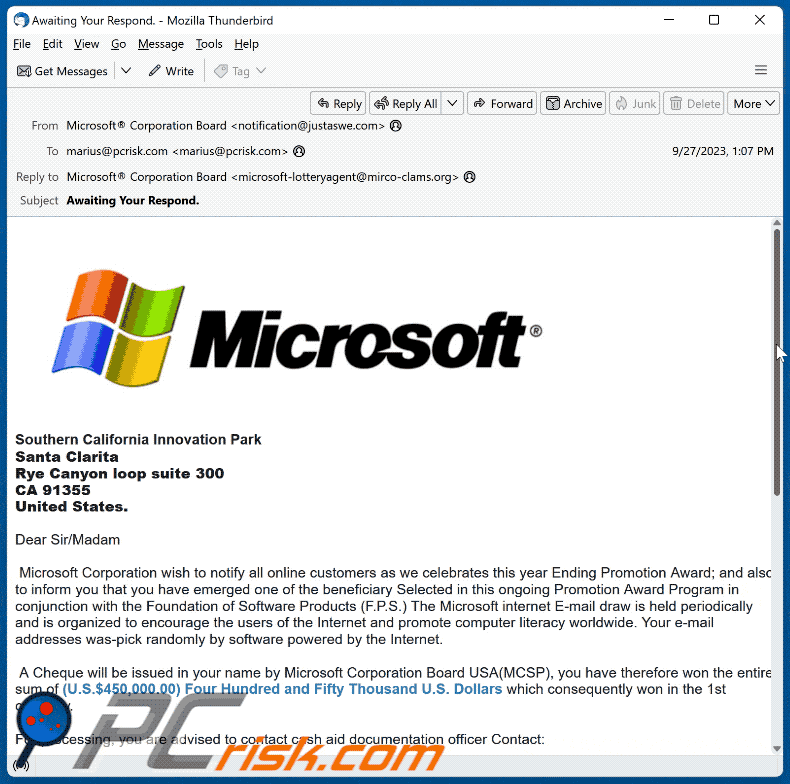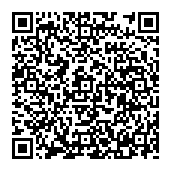How to spot scams like "Microsoft Ending Promotion Award"
![]() Written by Tomas Meskauskas on (updated)
Written by Tomas Meskauskas on (updated)
What is "Microsoft Ending Promotion Award"?
After reviewing this email, it has come to our attention that it is a fraudulent message falsely claiming to be from Microsoft. The scammers behind this scam are trying to deceive recipients by claiming they have won a large amount of money. Their objective is to entice recipients to share personal information and potentially send money.

More about the "Microsoft Ending Promotion Award" scam email
The message claims to be from Microsoft Corporation, announcing a year-ending Promotion Award. It asserts that the recipient has been selected as a beneficiary of this ongoing program, organized in conjunction with the Foundation of Software Products (F.P.S.).
The email states that the Microsoft Internet E-mail draw is held periodically to encourage internet usage and computer literacy worldwide, with email addresses selected randomly by internet-powered software.
The email goes on to inform the recipient that they have won a significant sum of money, specifically $450,000.00 in the 1st category. It indicates that a cheque will be issued in the recipient's name by Microsoft Corporation Board USA (MCSP).
In order to proceed with the process, the recipient is instructed to contact a cash aid documentation officer named Mr. James Wellman. The letter requests the recipient to provide personal information for prize validation, including their residential address, mobile phone number, nationality/country, full name, age/sex, occupation/position, and their opinion on Microsoft products.
The email concludes with congratulations from the Staff and Members of the Microsoft Board Commission. It urges the recipient to contact their Validating Officer within twenty-nine working days of receiving the winning notification to claim the prize.
This scam aims to collect personal information from the recipient, such as their residential address, phone number, and more. This information can then be used for various malicious purposes, including identity theft and further scams. After establishing contact with the recipient, the scammers may also ask for an "advance fee" or processing fee to release the supposed prize.
| Name | Microsoft Ending Promotion Award Email Scam |
| Threat Type | Phishing, Scam, Social Engineering, Fraud |
| Fake Claim | Recipients have won a lrge sum of money |
| Disguise | Letter from Microsoft |
| Symptoms | Unauthorized online purchases, changed online account passwords, identity theft, illegal access of the computer. |
| Distribution methods | Deceptive emails, rogue online pop-up ads, search engine poisoning techniques, misspelled domains. |
| Damage | Loss of sensitive private information, monetary loss, identity theft. |
| Malware Removal (Windows) | To eliminate possible malware infections, scan your computer with legitimate antivirus software. Our security researchers recommend using Combo Cleaner. |
Similar scams in general
Scams of this kind, often referred to as advance fee or lottery scams, share several common characteristics. They typically entice victims with the promise of winning a substantial sum of money, often through a lottery, prize, or sweepstakes they never entered. Also, they create a sense of urgency, urging victims to act quickly to claim their supposed prize within a specified timeframe.
In many cases, victims are asked to pay an advance fee or processing fee to release their alleged winnings. This payment is usually requested before any prize is delivered and is a key element of the scam. It is important to note that cybercriminals can use email as a tool to trick recipients into infecting their computers.
Examples of similar scams are "Donation From Coca-Cola Email Scam", "Mackenzie Scott Foundation Email Scam", and "American Express Merchant Reward Email Scam".
How do spam campaigns infect computers?
Attachments in emails, even seemingly innocuous ones like documents or software, can harbor malware when downloaded. Opening email attachments, especially from unfamiliar or untrusted sources, can potentially lead to the installation of malware on the recipient's computer.
Furthermore, clicking on links embedded in phishing emails can redirect users to malicious websites. These sites may employ drive-by downloads or social engineering techniques to exploit vulnerabilities and introduce malware onto the user's system.
Some emails may also tempt users to enable macros in attached documents, an action that can trigger the execution of malicious scripts and result in an infection.
How to avoid installation of malware?
To safeguard your computer and uphold a secure digital environment, exercise caution when it comes to opening email attachments or clicking on links, particularly if the sender is unfamiliar or the email raises suspicion. Refrain from engaging with ads from untrustworthy sources and steer clear of suspicious pages.
Frequently update your operating system, software applications, and web browsers to address potential vulnerabilities. Download files and programs from trustworthy sources like official websites or app stores. Additionally, install reputable antivirus and anti-malware software on your computer to protect against threats.
If you have already opened malicious attachments, we recommend running a scan with Combo Cleaner Antivirus for Windows to automatically eliminate infiltrated malware.
Appearance of the "Microsoft Ending Promotion Award" scam email (GIF):

Text presented in the "Microsoft Ending Promotion Award" email letter:
Subject: Awaiting Your Respond.
Microsoft
Description: Microsoft.com Visual History
Southern California Innovation Park
Santa Clarita
Rye Canyon loop suite 300
CA 91355
United States.Dear Sir/Madam
Microsoft Corporation wish to notify all online customers as we celebrates this year Ending Promotion Award; and also to inform you that you have emerged one of the beneficiary Selected in this ongoing Promotion Award Program in conjunction with the Foundation of Software Products (F.P.S.) The Microsoft internet E-mail draw is held periodically and is organized to encourage the users of the Internet and promote computer literacy worldwide. Your e-mail addresses was-pick randomly by software powered by the Internet.
A Cheque will be issued in your name by Microsoft Corporation Board USA(MCSP), you have therefore won the entire sum of (U.S.$450,000.00) Four Hundred and Fifty Thousand U.S. Dollars which consequently won in the 1st category.
For processing, you are advised to contact cash aid documentation officer Contact:
Mr. James Wellman
Email: microsoft-lotteryagent@mirco-clams.orgProvide below information for validation of your prize.
.Residential Address:
.Tel (Mobile):
. Nationality/Country:
. Full Name:
. Age/Sex:
. Occupation/Position:
. Alternative email account if any:
. What is your comment On Microsoft Products?Congratulations from the Staffs & Members of Microsoft Board Commission. To file for your claim, please contact your Validating Officer for VALIDATION of your winning within Twenty-nine working days of this winning notification.©2023Microsoft Corporation®
Sincerely,
MR JAMES WELLMAN
Microsoft Promotion Award Team.
.©2023Microsoft Corporation®
Instant automatic malware removal:
Manual threat removal might be a lengthy and complicated process that requires advanced IT skills. Combo Cleaner is a professional automatic malware removal tool that is recommended to get rid of malware. Download it by clicking the button below:
▼ DOWNLOAD Combo Cleaner
By downloading any software listed on this website you agree to our Privacy Policy and Terms of Use. To use full-featured product, you have to purchase a license for Combo Cleaner. 7 days free trial available. Combo Cleaner is owned and operated by Rcs Lt, the parent company of PCRisk.com read more.
Quick menu:
- What is Microsoft Ending Promotion Award lottery scam?
- Types of malicious emails.
- How to spot a malicious email?
- What to do if you fell for an email scam?
Types of malicious emails:
![]() Phishing Emails
Phishing Emails
Most commonly, cybercriminals use deceptive emails to trick Internet users into giving away their sensitive private information, for example, login information for various online services, email accounts, or online banking information.
Such attacks are called phishing. In a phishing attack, cybercriminals usually send an email message with some popular service logo (for example, Microsoft, DHL, Amazon, Netflix), create urgency (wrong shipping address, expired password, etc.), and place a link which they hope their potential victims will click on.
After clicking the link presented in such email message, victims are redirected to a fake website that looks identical or extremely similar to the original one. Victims are then asked to enter their password, credit card details, or some other information that gets stolen by cybercriminals.
![]() Emails with Malicious Attachments
Emails with Malicious Attachments
Another popular attack vector is email spam with malicious attachments that infect users' computers with malware. Malicious attachments usually carry trojans that are capable of stealing passwords, banking information, and other sensitive information.
In such attacks, cybercriminals' main goal is to trick their potential victims into opening an infected email attachment. To achieve this goal, email messages usually talk about recently received invoices, faxes, or voice messages.
If a potential victim falls for the lure and opens the attachment, their computers get infected, and cybercriminals can collect a lot of sensitive information.
While it's a more complicated method to steal personal information (spam filters and antivirus programs usually detect such attempts), if successful, cybercriminals can get a much wider array of data and can collect information for a long period of time.
![]() Sextortion Emails
Sextortion Emails
This is a type of phishing. In this case, users receive an email claiming that a cybercriminal could access the webcam of the potential victim and has a video recording of one's masturbation.
To get rid of the video, victims are asked to pay a ransom (usually using Bitcoin or another cryptocurrency). Nevertheless, all of these claims are false - users who receive such emails should ignore and delete them.
How to spot a malicious email?
While cyber criminals try to make their lure emails look trustworthy, here are some things that you should look for when trying to spot a phishing email:
- Check the sender's ("from") email address: Hover your mouse over the "from" address and check if it's legitimate. For example, if you received an email from Microsoft, be sure to check if the email address is @microsoft.com and not something suspicious like @m1crosoft.com, @microsfot.com, @account-security-noreply.com, etc.
- Check for generic greetings: If the greeting in the email is "Dear user", "Dear @youremail.com", "Dear valued customer", this should raise suspiciousness. Most commonly, companies call you by your name. Lack of this information could signal a phishing attempt.
- Check the links in the email: Hover your mouse over the link presented in the email, if the link that appears seems suspicious, don't click it. For example, if you received an email from Microsoft and the link in the email shows that it will go to firebasestorage.googleapis.com/v0... you shouldn't trust it. It's best not to click any links in the emails but to visit the company website that sent you the email in the first place.
- Don't blindly trust email attachments: Most commonly, legitimate companies will ask you to log in to their website and to view any documents there; if you received an email with an attachment, it's a good idea to scan it with an antivirus application. Infected email attachments are a common attack vector used by cybercriminals.
To minimise the risk of opening phishing and malicious emails we recommend using Combo Cleaner Antivirus for Windows.
Example of a spam email:

What to do if you fell for an email scam?
- If you clicked on a link in a phishing email and entered your password - be sure to change your password as soon as possible. Usually, cybercriminals collect stolen credentials and then sell them to other groups that use them for malicious purposes. If you change your password in a timely manner, there's a chance that criminals won't have enough time to do any damage.
- If you entered your credit card information - contact your bank as soon as possible and explain the situation. There's a good chance that you will need to cancel your compromised credit card and get a new one.
- If you see any signs of identity theft - you should immediately contact the Federal Trade Commission. This institution will collect information about your situation and create a personal recovery plan.
- If you opened a malicious attachment - your computer is probably infected, you should scan it with a reputable antivirus application. For this purpose, we recommend using Combo Cleaner Antivirus for Windows.
- Help other Internet users - report phishing emails to Anti-Phishing Working Group, FBI’s Internet Crime Complaint Center, National Fraud Information Center and U.S. Department of Justice.
Frequently Asked Questions (FAQ)
Why did I receive this email?
Fraudsters send identical messages to a wide audience, relying on the chance that they might mislead at least one person. These spam emails lack any form of personalization.
I have provided my personal information when tricked by this email, what should I do?
If you mistakenly provided personal information to a lottery scam email, cease all communication with the scammers. Also, monitor your financial accounts and credit reports for any unusual activity or signs of identity theft. Consider reporting the incident to your local law enforcement and relevant fraud prevention agencies to help prevent further misuse of your information.
I have downloaded and opened a malicious file attached to an email, is my computer infected?
If the file was an executable, the likelihood of infection is considerably high. However, for file types like .pdf or .doc, there is a possibility that you may have avoided infection, as merely opening such documents in certain cases may not provide malware with the opportunity to infiltrate your system.
I have sent cryptocurrency to the address presented in such email, can I get my money back?
These transactions are nearly impossible to trace, making it improbable for you to recover the funds.
I have read the email but did not open the attachment, is my computer infected?
Merely opening an email is entirely safe. The real risk comes when you click on links within the email or open attached files, which can result in system infections.
Will Combo Cleaner remove malware infections that were present in email attachment?
Combo Cleaner is capable of identifying and removing most malware infections. However, it is crucial to acknowledge that advanced malware can hide deeply within the system. A full system scan is essential to guarantee detection and removal.


▼ Show Discussion